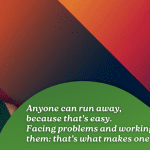By Assoc Prof Dr Zorah Abu Kassim, Faculty of Business and Management
The answer to the question “Do our attitudes predict our behaviour?” is not necessarily yes.
Our behaviour can be an indicator of our attitude depending on how intensely we hold that attitude towards something. This refers to how strongly or how deeply committed we feel about the object. One expert once defined attitude as a person’s tendency to react with a degree of favour or disfavour to something, whether it’s an object, person, institution or event.
The word “commitment” is also often used loosely in our social conversations. True commitment implies a willingness to give up time, energy and financial resources to gain something we value. For example, as a lecturer, I’ve often pondered the level of commitment among students who pay to enrol in an academic programme but regularly miss E-tutorials that are designed to support their studies.
Therefore, our behaviour can be predicted by how strongly we hold an attitude. For instance, take the common belief that snacking between meals is unhealthy – our behaviour in avoiding snacks might reflect how strongly we feel about that belief. The strength of this attitude is influenced by several factors:
- Social Roles
How important is the role we play? My role as an educator, for instance, shapes my strong views on education policies. I strongly support reforms in the education system and believe in lifelong learning. This belief drives me to enrol in MOOCs during my spare time – my attitude clearly influencing my behaviour.
- Depth of Commitment
When there’s no easy way out, our sense of commitment becomes more deeply rooted. Social pressures can make it difficult to withdraw from certain roles. For example, let’s say I lead a community project on environmental conservation such as upkeeping and maintaining a community garden for residents in my housing area. It would be challenging for me to withdraw or alter my stance or attitude in relation to local environmental conservation initiatives.
- Freedom of Choice
Sometimes, we have little or no choice in our attitude towards an object. For example, there is talk of supporting government programmes on taxes but this can be just talk. The whole thing seems to have “come down from above” – the typical citizen doesn’t feel committed to vote “Yes” if a referendum on taxes is held nationwide.
- Knowledge and Understanding
How much we know about something can also influence how strongly we feel. For example, we may not feel positively towards Trigonometry because we can’t add. I used to hate Maths as a subject in school because I thought I didn’t like numbers. Only later in life did I realise this was because I was afraid of my secondary school Maths teacher as she had a dreadful temper. I had associated numbers with her outbursts of temper in the classroom.
In consumer marketing, advertising plays a huge role in shaping attitudes by providing knowledge about brands. The more informed a consumer is about a brand’s benefits, the more likely they are to view it favourably and eventually make a purchase. This is an example of how knowledge strengthens attitude and leads to action.
- Perspective-Taking
Seeing a problem from multiple angles can shift our attitude. For example, a company implementing flexible work policies may benefit from viewing the issue not only in terms of costs but also from the perspectives of employees, managers and technology. In consumer culture, third-party review sites are often more credible than brand websites. These multiple viewpoints can make a person more positively inclined towards a brand.
- Resistance to Change
Strong attitudes can be like granite – difficult to shift. The stronger and more deeply rooted our beliefs, the more resistant we are to changing them. This is why people with high attitude intensity are often the most steadfast.
Yet, it’s important to remember that attitudes alone don’t always determine behaviour. For example, I might dislike someone I meet at a party, but I won’t throw something at them. Instead, I’ll smile and act politely because social norms require it. In this case, my behaviour doesn’t reflect my true feelings.
In summary, attitudes are complex. While they can influence behaviour, they are not the only factor. Other elements like social roles, knowledge, social pressure, and norms also play a significant part in shaping what we do.









